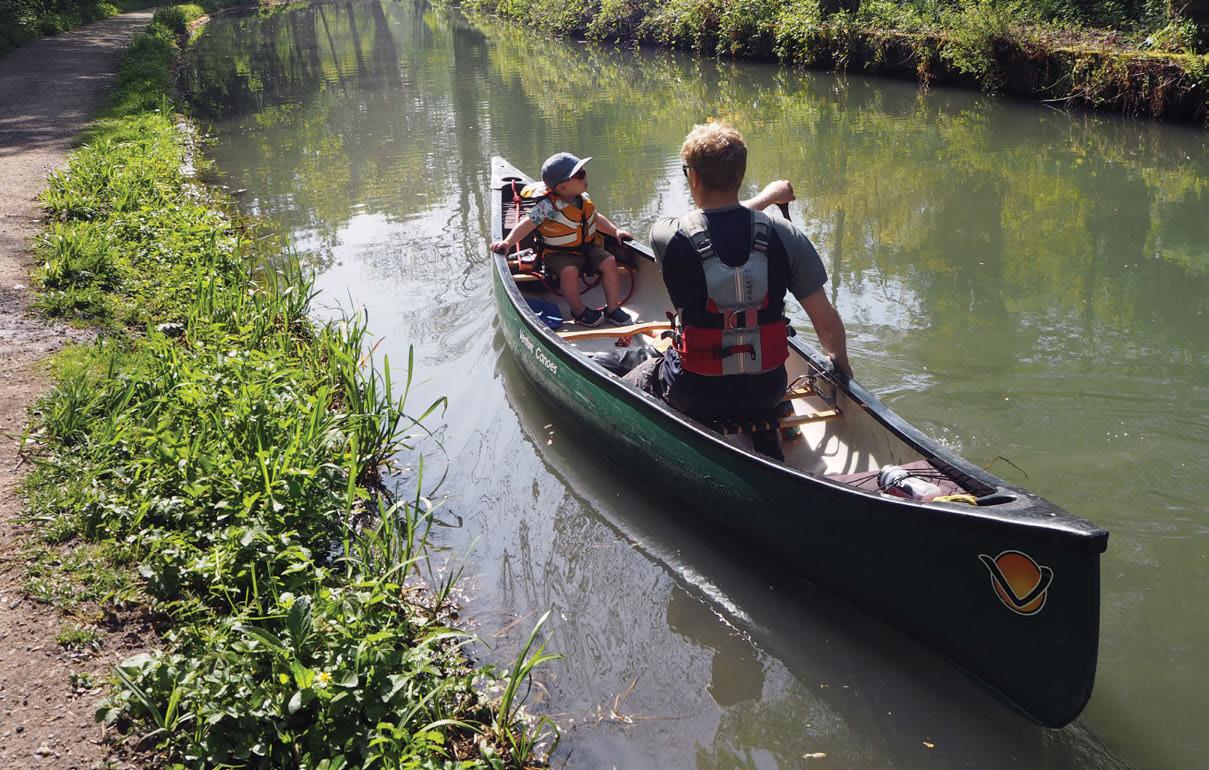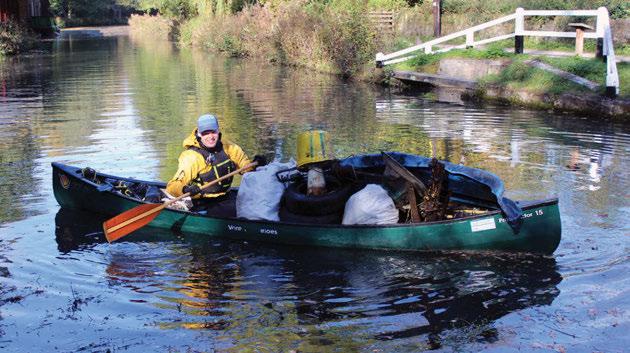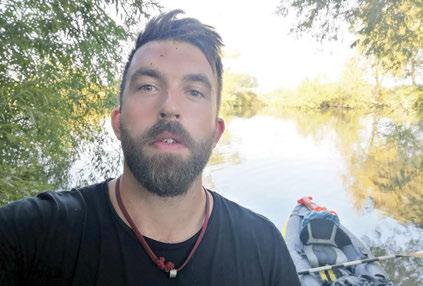
7 minute read
Access All Areas
British Canoeing has been calling for new legislation to clarify and secure the right to paddle on waterways in England and Wales.
Of the 57,600km of rivers in England, we have a right of navigation on 2,000km – little more than 3%. As the campaign to open up our inland waterways heats up, we look at progress to date and the main players driving this change...
Narrowboaters may not have given the issue much thought. On canals and some larger rivers where a Statutory Right of Navigation exists, a waterway licence allows us to enjoy the space without challenge. Get off the connected system and onto the backwaters favoured by smaller craft, however, and the picture couldn’t be more different.
“In England, if you’re by a river, on a river or in a river, there’s a 97% chance that you’re not allowed to be there,” says Nick Hayes, Right to Roam campaigner and author of one of this year’s most provocative reads, The Book of Trespass. “While the Crown is said to own the water that flows through a river, the landowner holds the rights to the riverbank, which extends across its bed towards an imaginary line drawn halfway through the watercourse. To kayak or swim along a stretch of river you must have permission from each and every one of the property owners on the banks.”
This is not the case in most European countries, he points out. And even in places like Australia and America, which are based on English common law, rivers are free to explore and enjoy as ‘common highways’, as the Founding Fathers put it.
“In Scotland, following the Land Reform Act of 2003, the public right of access supersedes the private landowner’s right to exclude. Rivers are effectively treated as Rights of Way. This freedom doesn’t exist in England except on rivers which have had a very specific act of government to declare public right of navigation. Even here, however, lack of clear signage can sometimes make it impossible to know which rivers are accessible and which aren’t.”
The contested nature of our waterways is felt most acutely by paddlers and swimmers. “Many of us run the gauntlet of being threatened, abused or worse, each time we venture out onto the water,” says Ben Seal, Places to Paddle manager at British Canoeing. As a consequence, over the last two years the organisation has significantly stepped up its efforts on access and environmental matters. Guided by the ambition to see ‘fair, shared, sustainable open access on water’, its Clear Access, Clear Waters campaign, backed by IWA, has made significant strides forward in presenting a case to Government and building a supportive coalition for change.
Coalitions
In recent weeks, for example, British Canoeing has been working in partnership with the Ramblers and the British Mountaineering Council to affect new agricultural legislation passing through the Lords. In addition, the publication of Nick Hayes’ book this summer shone another spotlight on its campaign, presenting further opportunity to join the wider debate on access to the countryside generally.
'The issue is likely to get even more coverage over coming months with the Government’s move to criminalise trespassing (it is currently defined in law as a civil matter). This could make it possible to seize the property and vehicles of trespassers “who enter onto any land without permission of the occupier with the intention to reside”. While the changes are aimed at travellers who set up unauthorised caravan sites, could it apply to liveaboard boaters as well? asks Nick. “If I were caught on land I hadn’t asked for permission to moor on, would this law permit police to take my boat?”
'Great Benefits'
But at the heart of British Canoeing’s campaign is the belief our waterways can make a profound difference on day-to-day lives. “Fundamentally, the case for more people to be more active and connected with nature is already made,” argues Ben. “Not since the end of the Great Wars has our nation so needed access to the countryside for recreation and for healing. Pre-Covid, our country was already facing an increasing obesity crisis and catastrophic threats to our climate. Now, while we are still in the grip of a global pandemic, we have seen how immensely valuable access to green space has been for millions and millions of people.

Ben Seal combines paddling with a litter pick. A ‘citizens’ army’ could tackle issues of plastic and sewerage pollution in our rivers, he suggests, but they would need uncontested access to them first.
“It is a simple fact that being physically active makes us more resilient to illness. It improves our mental well-being and, importantly for our environment, it brings us closer to nature. It stands to reason that if we cannot access these spaces on our doorstep, then sections of the population will not have access to the great benefits it brings.”
Canoe clean-ups
As well as seeking new legislation to open up the waterways, British Canoeing also advocates greater protection of the environment, committing to river cleanups, action to address invasive non-native species and improving water quality.
Both Ben and Nick are scathing of counter-arguments that opening up our waterways could have a detrimental effect on the wildlife it accommodates. On the contrary, says Nick, “the more people are allowed to enjoy our rivers, the more motivated they will be to protect them. The more they have a visceral experience of the small-scale, micro environment of nature, the more they will care about the macro elements like climate change. Put simply, the environment is often better off for having more people access it.”
He points to a British Canoeing scheme which has seen kayakers on the Derwent take an empty bag with them on trips, returning with rubbish they have collected along the way. “With more people out on the rivers, there will be more eyes to pick up on spillages or pollution, more people to clear the rivers of litter and obstructions, so improving the ecology of our most vital resources.”
Patience pays off
While progress is undoubtedly being made, Ben is realistic that it may be years before our waterways finally become a fairer place for all. “Changing legislation is not something that is easy to achieve. Very few Bills make it onto the statute book each year and in the present climate, legislation to affect access on inland waters is unlikely to be amongst the Government’s highest priorities. It takes time and patience. Many people point to the Kinder Trespass in 1932 as the defining moment in the fight for access to our mountains and moors. While it will go down in history as a major landmark for the movement, it took until the year 2000, 68 years later, for the Countryside and Rights of Way Act to realise the aspirations of those brave individuals.”
Nevertheless, he’s confident the campaign will go from strength to strength in the meantime. “With the future of how our landscape is managed by farmers currently being shaped, with National Parks and AONBs in the spotlight, with a surge of interest in being outdoors, especially on water, now is our best opportunity to be making our case for clarity on the right of access for all.”

Accessing rivers shouldn’t be a crime, argues author and Right to Roam campaigner Nick.
Find out more
For further information on British Canoeing’s Clear Access, Clear Waters campaign visit clearaccessclearwaters. org.uk. The organisation is appealing for people to sign its petition to secure fair, shared and sustainable open access to waterways in England and Wales, as well as lobbying their local MP on the issue.
Alternatively, visit righttoroam.org.uk, the website launched by Nick Hayes and environmental campaigner/author Guy Shrubsole. They’re working to extend the Countryside and Rights of Way Act so that it covers more of the countryside as well as a greater range of activities, both on land and water.









